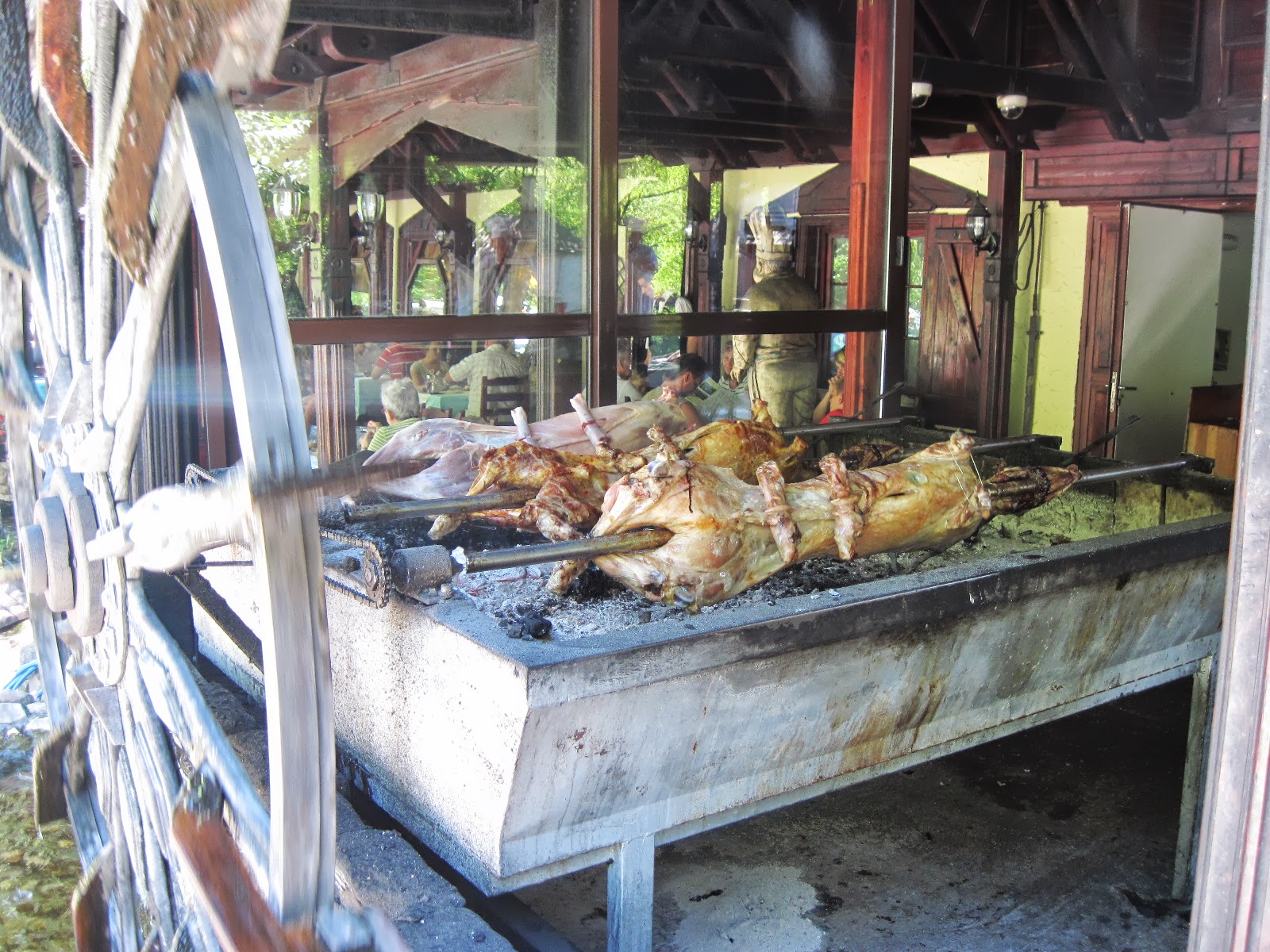7/22 Monday
Moving day. We walk down the hill to
the bus station in the cool of early morning. Our bus to Sarajevo will make
three border crossings: along the coastal road into Bosnia-H for about 30
miles, back into Croatia, then into Bosnia-H again as we head inland. The last
crossing is a real pile-up, a two-lane highway with a couple of booths in a
small town. Part of the log jam of cars and tour buses is caused by the regular
coffee break going on, as we see three customs agents enjoying their espressos
while we wait.
We’re finally through, and in our
fifth country. It’s different almost immediately, as we see minarets alongside
the church steeples in the towns as we pass. Almost every quarter mile, there’s
a fruit and vegetable stand, selling watermelons, plums, peppers, tomatoes,
wines and grapes from the small farms and vineyards all along the way.
The
landscape becomes mountainous, although we’re following the flat passage along
the Nerevta River. We have a brief stop in Mostar, a popular destination for
the tours. The historic, medieval old city was terribly destroyed in 1992, bombed
by the Yugoslavian and Croatian armies. Many of it’s treasured monuments were
lost: the bridge, cathedral, mosques, the ancient library and more. As we drive
through the streets, we can still see buildings riddled with bullet holes,
blackened shells of hotels or apartments, war scars very much in evidence
everywhere. It’s also very disturbing to
see that so much of the damage is in what are clearly residential parts of the
city, that the fighting was right on everyone’s very doorstep.
The bus continues through a
landscape that reminds us of Colorado or New Mexico, high granite
ridges, bright blue river, mixed forests of pines and hardwoods on the
mountainsides. The towns are more alpine than Mediterranean. In the pastures,
there are structure that look like hay teepees, about six or eight feet high,
all along the farmlands. Instead of fruits, the roadsides vendors offer jars of
honey, stacked on plank saw-horse tables, gold to dark amber. I wonder if the
haystacks are giant beehives, but I can’t find any information on it…yet.
We make a twenty minute stop at a
restaurant, but it’s strange because it’s a nice, sit-down tourist spot,
nothing at all for quick sales to a bus group, not even a soda machine. It’s ok
for a bathroom break. All the diners are enjoying their dinners while the bus
riders are milling around the parking lot. They have lot valets with big hoses
spraying water over the asphalt to cool the place down. We wish we did have time to eat, though,
because the specialty is traditional roast lamb. They have great coal fire
pits, each with a waterwheel working a set of spits over the fire, each spit
holding an entire lamb, in progressive stages of roasty doneness. It’s quite a
sight, and everyone takes photos and videos. The patrons are all served great
platters of chunks of meat. The restaurant is situated on a high ridge looking
over the river, open-air and sheltered by leafy trees. It’s very nice. We have
a suspicion that the bus drivers are at a secret table having a nice lamb lunch
while we wait.
We arrive in Sarajevo along a parkway
stretch of modern malls, car dealerships, office buildings, typical commercial
sprawl. Our host, Adnan picks us up at the bus station and takes us to his
apartments. We go upstairs, and he tells us he has small problem. And so do we.
Although we make our bookings for whole apartments only, this is obviously an
apartment of several rooms with a shared dining room, kitchen and bathroom. His
problem is that someone booked our room on another site before he accepted our
booking, so we need to stay in a twin bed room with no balcony for tonight,
then we move to our double bed, balcony room tomorrow.
OK, so these things happen. Adnan makes an effort to appease us, giving
us a key to one bathroom for ourselves, and jars of homemade apricot jam and
ajvar.
The old city is just two blocks or
so away, an easy 5 minutes walk. The diversity of the people here is
immediately evident. Tall, short, dark,
fair, old young, covered, uncovered, any other opposite combinations you could
think of. It seems there are dozens of mosques in the area. A couple are quite
large and obviously important sites for the tourists. We look into the grounds
but don’t enter. There a avenues of shops with a broader selection of tourist
knick-knacks and quality items, jewelry, textiles, metalwork. Some of it is
really beautiful. I have a hard time walking past a man selling lovely goat and
sheepskins, gorgeously wooly, but Bob gives me a Look.
We stop for dinner at a popular spot
for the regional specialty, ćevapi, which is minced beef and spices
rolled into little hot dog shapes and roasted or grilled. That’s pretty much
all that’s on the menu here, and the waiter just brings out the same plates to
set up each tableful of diners. The choice is just how many pieces do you want,
5, 10 or 15. We sit down, and our table is shared by a young couple from
Toronto. Her family is from Bosnia, taking her to Canada at the age of two,
escaping from the war.
We get the dinner, ćevapi, with a
big soft pita, diced onions, and a cream cheese spread in a side dish. The
drink we have is a kefir yogurt. Our Toronto friend, the guy, gets an order
with 15 pieces. It’s quite a dishful.
As we walk home, the evening has set
in, cooling everything down. The streets are decorated with strings of lights,
and lots of people are out walking and sitting in the cafes.






No comments:
Post a Comment